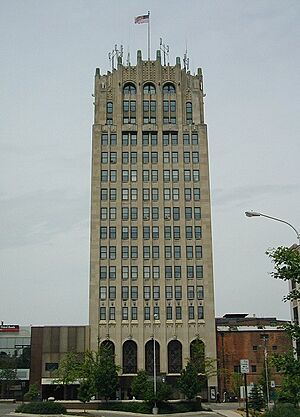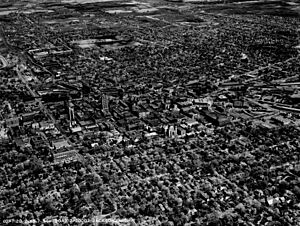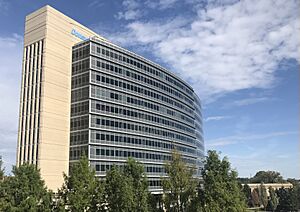Jackson, Michigan facts for kids
Quick facts for kids
Jackson, Michigan
|
|||
|---|---|---|---|
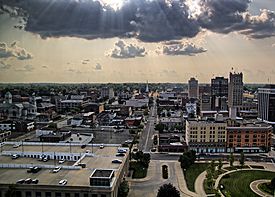
Downtown Jackson from the 12th floor of One Energy Plaza (CMS Energy headquarters)
|
|||
|
|||
| Nickname(s):
The Rose City
|
|||
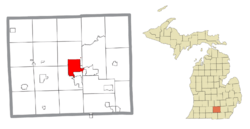
Location within Jackson County
|
|||
| Country | United States | ||
| State | Michigan | ||
| County | Jackson | ||
| Founded | 1829 | ||
| Incorporated |
|
||
| Government | |||
| • Type | Mayor–council | ||
| Area | |||
| • City | 10.96 sq mi (28.38 km2) | ||
| • Land | 10.84 sq mi (28.07 km2) | ||
| • Water | 0.12 sq mi (0.30 km2) | ||
| Elevation | 932 ft (284 m) | ||
| Population
(2020)
|
|||
| • City | 31,309 | ||
| • Density | 2,889/sq mi (1,115.4/km2) | ||
| • Metro | 160,366 (US: 264th) | ||
| Time zone | UTC−5 (EST) | ||
| • Summer (DST) | UTC−4 (EDT) | ||
| ZIP Codes |
49201–49204
|
||
| Area code(s) | 517 | ||
| FIPS code | 26-41420 | ||
| GNIS feature ID | 0629165 | ||
Jackson is the main city of Jackson County in the U.S. state of Michigan. In 2020, about 31,309 people lived here. It is located near major highways, about 65 miles (105 km) east of Kalamazoo. It is also 75 miles (121 km) west of Detroit and 35 miles (56 km) south of Lansing. Jackson is the main city of the Jackson Metropolitan Statistical Area. This area includes all of Jackson County and has a population of 160,248.
The city was founded in 1829 and named after President Andrew Jackson. Michigan's first prison, Michigan State Prison, opened in Jackson in 1838. For a long time, Jackson was known as the "birthplace of the Republican Party". This is because politicians met here in 1854 to speak out against slavery. The party now officially recognizes its birthplace as Ripon, Wisconsin. However, Jackson's role is remembered with a plaque in Under the Oaks City Park. Many Republican presidents have visited this park.
In the early 1900s, Jackson became an important place for making cars. Many factories opened, bringing people from the South and other countries to the city. This caused Jackson's population to grow a lot.
Contents
History of Jackson
On July 3, 1829, Horace Blackman explored the area where Jackson is today. He was with Alexander Laverty, a land surveyor, and Pewytum, a Native American guide. They camped near what is now Trail and N. Jackson Street. They followed an old Native American trail from Ann Arbor. Blackman later claimed 160 acres (65 ha) of land.
He returned in August 1829 with his brother Russell. They built a cabin at what would become Ingham and Trail streets. The town was first called Jacksonopolis. Later, it was renamed Jacksonburgh. In 1838, the name was changed to simply Jackson.
Birthplace of the Republican Party
Jackson is one of the places where the Republican Party began. The first official meeting of the group calling itself "Republican" happened in Jackson on July 6, 1854. A historical marker shows the spot at Second and Franklin streets.
People met outside because a hall was too hot and crowded. They chose candidates for state elections. This event is seen as the start of the Republican Party. The place, an oak grove, became known as "Under the Oaks."
Jackson's Auto Industry
Before Detroit started making cars on assembly lines in 1910, Jackson factories were busy. They made car parts and put cars together. By 1910, the auto industry was Jackson's main business. More than 20 different car brands were once made here. Some names include Jaxon, Jackson, Buick, and Imperial.
Ye Ole Carriage Shop in Spring Arbor shows over 60 old and classic cars. Sixteen of these cars were made in Jackson, including a 1902 JAXON. Today, making auto parts is still a big job in Jackson County. The city was also an early center for making moped parts.
The Famous Coney Island Hot Dog
In 1914, Macedonian immigrant George Todoroff opened the first "Coney Island restaurant" in Jackson. He created his famous Coney Island hot dog topping. His restaurant was right in front of the railroad station and was open all day and night. It was a popular spot for train passengers.
Over 31 years, Todoroff sold more than 17 million Coney Island hot dogs. Today, two Coney Island restaurants are near the train station. They are Virginia Coney Island and Jackson Coney Island. Many other restaurants in the area also serve their own "coney" dogs. Jackson's coney dog is different from those in Detroit. In 2014, Todoroff's Coney Island celebrated 100 years.
Michigan's First State Prison
Michigan's first state prison was approved in 1838. A temporary wooden prison was built on 60 acres (24 ha) in Jackson. In 1839, the first 35 prisoners arrived. A permanent prison was built three years later.
By 1882, Michigan's First State Prison (1838–1934) was the largest walled prison in the world. Factories and farms inside the prison used inmate labor. This helped make Jackson a leading industrial city. In 1934, a new prison was built north of Jackson. All state prisoners moved there.
The old prison building is now an art community called the Armory Arts Village. You can take tours of the original prison site on Cooper Street. A closed cell block at the modern prison was a museum from 2014-2019. It was the only museum where visitors could enter a closed cell block on active prison grounds.
Corset Industry in Jackson
Many railroads connected to Jackson, linking it to different markets. The invention of the duplex corset by Bortree made Jackson a center for making corsets. By the early 1900s, up to 16 companies made women's corsets here. Most were on Cortland and Pearl streets.
When elastic materials became popular and fashions changed, the corset industry quickly slowed down. Most corset companies in Jackson closed by 1920. Only three companies lasted past the 1920s. They survived by making medical support garments instead.
- The First: Moses Bortree started the Bortree Corset Company in 1868. It was the first corset maker outside of New York. They began making the Duplex Corset in 1875. In five years, they went from making 50,000 to 300,000 corsets each year.
- The Biggest: The Jackson Corset Co. started in 1884. It became the largest maker of corsets in the U.S. By 1895, they had almost 300 employees.
- Woman-Owned: The Coronet Corset Manufactory opened in 1880. It was special because it was run by the first and only female president, Mrs. C.A. McGee. She also invented and patented the Coronet Corset.
Geography of Jackson
The city of Jackson covers about 10.98 square miles (28.44 km²). Most of this area, about 10.86 square miles (28.13 km²), is land. The rest, about 0.12 square miles (0.31 km²), is water.
Economy and Jobs
When heavy industries changed in the mid-1900s, Jackson lost jobs and people. Today, there are three main private employers in the city. CMS Energy provides natural gas and electric services to much of Michigan. Its main office is in Jackson. The next two big employers are Henry Ford Health (formerly Foote Hospital) and the Eaton Corporation.
Michigan Automotive Compressor, Inc. (MACI) is the largest manufacturer in Jackson County. It is also the fourth-largest employer. Dawn Foods, a family-owned food company, has been based in Jackson since 1920. Jackson Flexible Products, just outside the city, makes custom rubber parts. They provide parts for airplanes, cars, and defense.
Jackson's state prison complex includes the first state prison building. Parts of the prison complex closed in 2007. One closed cell block was made into the Cell Block 7 Prison Museum. Other parts of the prison complex are still open today.
Education in Jackson
Jackson is served by Jackson Public Schools. The Jackson area has about 16 public elementary schools. It also has about 16 private or religious schools. There is one large public middle school, The Middle School at Parkside.
Jackson has nine high schools:
- Public: Jackson High School, East Jackson Secondary School, Western High School (in Parma), and Northwest High School.
- Other: T. A. Wilson Academy, Napoleon High School, and Vandercook Lake High School.
- Private/Charter: DaVinci Institute (Charter), Jackson Preparatory and Early College (Charter), Jackson Christian School, and Lumen Christi Catholic School (Catholic).
The city also has places for adult and higher education. These include Jackson College (formerly Jackson Community College), Baker College, and Spring Arbor University. There are 15 more colleges within an hour's drive of Jackson County.
Transportation in Jackson
From the late 1800s to the mid-1900s, Jackson was a major railway center. For over a century, it has been known as the crossroads of Michigan. Today, the Michigan Central Railroad Jackson Depot is the oldest train station in the U.S. that is still used. It was added to the National Register of Historic Places in 2002.
Amtrak, the national passenger train system, serves Jackson. Its Wolverine train runs three times a day. It travels between Chicago and Pontiac, Michigan, passing through Detroit. You can bring carry-on bags, but you cannot check luggage at this station.
The Jackson and Lansing Railroad (JAIL) owns a train line from Jackson to Lansing, Michigan. Norfolk Southern (NS) also has a train yard in Jackson.
Major Highways
The main highways in Jackson include:
 I-94: A major interstate highway.
I-94: A major interstate highway. BL I-94: A business loop of I-94 through Jackson.
BL I-94: A business loop of I-94 through Jackson. US 127: A north–south highway connecting to Lansing and Ohio. It runs with I-94 for about 4 miles (6.4 km) in Jackson.
US 127: A north–south highway connecting to Lansing and Ohio. It runs with I-94 for about 4 miles (6.4 km) in Jackson.


 Bus. US 127: A loop route through downtown Jackson.
Bus. US 127: A loop route through downtown Jackson. M-50: Enters Jackson from the northwest and leaves southeast of town.
M-50: Enters Jackson from the northwest and leaves southeast of town. M-60: Comes into Jackson from the southwest and ends at I-94.
M-60: Comes into Jackson from the southwest and ends at I-94.- M-106: Enters Jackson from the northeast and ends downtown.
Jackson County Airport
Reynolds Field at Jackson County Airport is the city's main airport. It used to have commercial flights until 1984. Now, it is used for general aviation, like private planes. The airport is 700 acres (283 ha) and has an ILS system for landing. Over 100 general aviation aircraft are kept here.
The airport is home to many businesses, including the Jackson College Flight School. It also has a restaurant, a bar, and car rental services. The Jackson Blues Festival is held here every June.
Public Transportation
The Jackson Area Transportation Authority (JATA) runs ten bus routes. They operate Monday through Saturday from a central station downtown. Indian Trails and Greyhound Lines offer bus services to other cities from the JATA station. In addition to JATA, there are four private taxi companies in town.
Parks and Recreation
The City of Jackson Parks and Recreation Department offers many fun activities:
- 1 18-hole golf course
- 1 driving range
- 1 miniature golf course
- 1 outdoor swimming pool
- 2 community recreation centers
- 2 outdoor volleyball courts
- 3 baseball fields
- 7 picnic shelters
- 11 soccer fields
- 12 outdoor basketball courts
- 17 softball fields (4 with lights)
- 14 playground areas
- 26 parks, covering 645 acres (261 ha)
Some of the parks include:
- Blackman Park: A small city park on Michigan Avenue. It has a fountain honoring Civil War soldiers, benches, and plants.
- Falling Waters Trail: A 10.5-mile (16.9 km) paved trail that follows an old railroad bed. It goes from Weatherwax Road in Jackson to the village of Concord. It is a Jackson County Park. The trail is mostly in the countryside. It also crosses Lime Lake County Park, where you can fish.
- Sparks Park and The Cascades: One of the largest parks in the county. It has the Cascades Championship Golf Course (18 holes) and a short 9-hole course. There are also playgrounds, basketball courts, and sports fields. It is famous for the Cascade Falls. This is one of the largest man-made waterfalls in the world. It has 6 huge fountains, 3 pools, and 16 falls. The Cascades Manor House hosts events. The park also has the Cascades Ice Cream Co. Every August, the annual Cascades Civil War Muster is held here. There are ponds and wetlands with many types of birds. In 2012, an urban fishing pond opened. It has signs, a picnic gazebo, and a wheelchair-friendly fishing pier.
- Dahlem Environmental Education Center: A nature center in Summit Township. It has an education center, five miles (8 km) of trails, ponds, wetlands, and a forest. A special trail is designed for visitors with limited movement. Dahlem is also known for having one of the largest eastern bluebird trails.
- Ella Sharp Park: The largest city park, covering 562 acres (227 ha) along the Grand River. It has a golf course, miniature golf, flower gardens, and miles of trails. There is also a basketball court, soccer fields, softball fields, the Peter Hurst Planetarium, and the Ella Sharp Museum. The Ella Sharp Park hosts the annual Jackson Hot Air Jubilee in July.
- Nixon Park: A water park in Jackson. It has a public pool and water park with two large water slides. There is also a skateboard park with ramps, an inline hockey rink, and softball fields.
Sports in Jackson
JAX 60 Lanes in Jackson has hosted many professional ten-pin bowling events. These include events for the PBA Tour and PBA50 Tour. In July 2023, the center hosted the first PBA50 World Series of Bowling.
Notable People from Jackson
Many famous people have connections to Jackson, Michigan:
- Fairuza Balk – actress
- Austin Blair – governor of Michigan during the Civil War
- Dan Coats – U.S. senator and Director of National Intelligence
- Tony Dungy – NFL player and coach, won Super Bowl XLI
- Paula Faris – television correspondent for ABC News
- James Earl Jones – famous stage and screen actor
- Karch Kiraly – Olympic gold medalist in volleyball
- Cheslie Kryst – Miss USA 2019
- James McDivitt – NASA astronaut
- Harry Melling – NASCAR team owner
- Tyler Oakley – YouTuber and LGBT activist
- Jack Paar – television personality, host of Tonight Starring Jack Paar
- Potter Stewart – U.S. Supreme Court justice
- Alfred Worden – NASA astronaut who traveled to the Moon
- Wendy Wyland – diver, Olympic bronze medalist
Sister Cities
Jackson has two sister cities:
 Varel, Germany
Varel, Germany Carrickfergus, Northern Ireland, United Kingdom
Carrickfergus, Northern Ireland, United Kingdom
Images for kids
See also
 In Spanish: Jackson (Míchigan) para niños
In Spanish: Jackson (Míchigan) para niños






